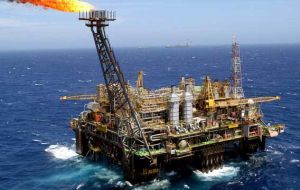MercoPress. South Atlantic News Agency
Brazil ponders about wealth from recent huge oil finds

Towering above the beautiful bay of Angra dos Reis near to Rio de Janeiro a vast oil platform stands almost ready to head out to sea. Work is almost completed on Petrobras 51 (P-51) and there seems little doubt it will be put to good use, with Brazil making headlines around the world for its recent oil finds.
One field known as Tupi is said to hold between 5 and 8 billion barrels of oil and gas. There have been suggestions from official sources that another may contain as much as 33 billion barrels. Some oil experts have suggested that recent oil finds actually amount to one continuous area. More than 4,000 people were involved in building P-51, which is the first semi-submersible platform to be constructed entirely in Brazil. Inside it is a network of pipes, cranes, working areas, a helicopter platform and accommodation for 200 people, altogether weighing more than 48,000 tons. When the platform is fully operational it will able to produce 180,000 barrels of petroleum daily as well as 6 million cubic meters of gas, yet another indication of Brazil's growing strength as an oil-producing nation. But with oil comes wealth - and just how this should be managed has now become the subject of an increasingly controversial debate. The new finds have prompted the Brazilian government to say it wants a bigger share of the profits. These would be used to help confront the country's social problems, rather than just leave this to Petrobras, the state-run oil company, and its international partners. While Petrobras is state-controlled, around 60% of its capital is in private hands. One alternative being considered is to create a fully state-owned company to manage the new reserves found in what are called the pre-salt area, because of their depth under layers of rock and salt. Brazil's President Lula has been at the forefront of the argument. "We don't want to lose hold of this wealth that is 6,000 meters deep," he said earlier this month. "It is the wealth of the country, it is the wealth of 190 million Brazilians, and we have to use this wealth to help the poor of the country." He said money needed to be set aside "to resolve definitively the problem of education in this country, to resolve the problems of millions of poor that are here, and not leave it in the hands of half a dozen companies that think the petrol belongs to them." A commission is studying various proposals over how to achieve this, and will report later in the year. But this discussion has already caused concern for private investors in Petrobras, and among foreign partners hoping for big profits in the future. Rafael Schechtman of the Brazilian Infrastructure Institute (CBIE) believes the government's motivation is clear. "I think the government has two views about creating a new company," he says. "One of these is to have large control of the oil production, and this a nationalist view to keep control of the oil production. The other concern is about getting most of the profit from the oil." The depth of the new oil fields - found beneath water, rock and salt, represent a significant challenge for Petrobras. Investment in new technology means initial costs will be extremely high but senior mangers at Petrobras, which has a lot of experience in deep sea oil exploration, are confident about the future. Petrobras president Sergio Gabrielli told the BBC News website that total production would increase from 2.3 million barrels a day in Brazil to 4.1 million barrels a day by 2015. "And this is before Tupi, for sure Tupi and the pre-salt area will increase those numbers, mostly after 2013, but for sure we are going to get a bigger number than that," he added. As for how much oil there actually is, the president of Petrobras says at the moment nobody knows for sure until further work is done. Brazil has in recent years presented itself as a world leader in environmentally friendly bio-fuels, but analyst Rafael Schechtman does not see any contradiction in its growing strength as an oil producer. "I think Brazil will still carry on its programme of ethanol because ethanol is still cheaper than gasoline, and so I don't think there is a contradiction. "Brazil will probably become a large exporter of oil products and keep developing bio-fuels and bio-energy because it is a very large resource in the country." "Brazil does not think that ethanol is a solution for the whole world [in energy terms] - it only plays a small part." "It is impossible to supply all the fuel used in the world from bio- energy, but it can play a very important role and is very important for developing countries that need new sources of revenue." But he sounds a note of caution about Brazil's recent discoveries. "I think Brazil should take care not to have oil as the only financial resource and to also use this money to develop other industries." The challenge for Brazil is to extract the oil as cheaply as possible. But as Latin America's largest country looks to the future, it seems the bigger issue is how to manage the wealth that comes with recent discoveries. By Gary Duffy - BBC News, Rio de Janeiro




Top Comments
Disclaimer & comment rulesCommenting for this story is now closed.
If you have a Facebook account, become a fan and comment on our Facebook Page!